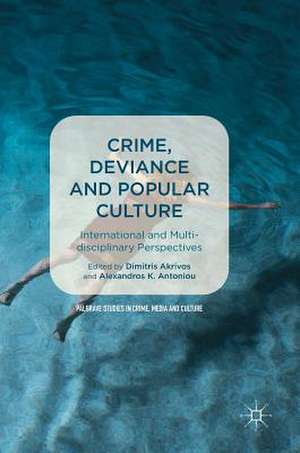Crime, Deviance and Popular Culture: International and Multidisciplinary Perspectives: Palgrave Studies in Crime, Media and Culture
Editat de Dimitris Akrivos, Alexandros K. Antoniouen Limba Engleză Hardback – 5 feb 2019
Din seria Palgrave Studies in Crime, Media and Culture
-
 Preț: 206.51 lei
Preț: 206.51 lei - 20%
 Preț: 689.54 lei
Preț: 689.54 lei - 15%
 Preț: 697.32 lei
Preț: 697.32 lei - 15%
 Preț: 698.15 lei
Preț: 698.15 lei - 9%
 Preț: 867.20 lei
Preț: 867.20 lei -
 Preț: 315.18 lei
Preț: 315.18 lei - 18%
 Preț: 783.35 lei
Preț: 783.35 lei - 18%
 Preț: 728.74 lei
Preț: 728.74 lei - 15%
 Preț: 644.95 lei
Preț: 644.95 lei - 15%
 Preț: 638.57 lei
Preț: 638.57 lei -
 Preț: 450.88 lei
Preț: 450.88 lei - 15%
 Preț: 693.21 lei
Preț: 693.21 lei - 15%
 Preț: 692.24 lei
Preț: 692.24 lei - 18%
 Preț: 892.42 lei
Preț: 892.42 lei - 9%
 Preț: 742.77 lei
Preț: 742.77 lei - 18%
 Preț: 783.20 lei
Preț: 783.20 lei
Preț: 1004.81 lei
Preț vechi: 1225.37 lei
-18% Nou
Puncte Express: 1507
Preț estimativ în valută:
192.30€ • 200.02$ • 158.75£
192.30€ • 200.02$ • 158.75£
Carte tipărită la comandă
Livrare economică 14-28 aprilie
Preluare comenzi: 021 569.72.76
Specificații
ISBN-13: 9783030049119
ISBN-10: 3030049116
Pagini: 315
Ilustrații: XVII, 343 p. 12 illus.
Dimensiuni: 148 x 210 x 27 mm
Greutate: 0.59 kg
Ediția:1st ed. 2019
Editura: Springer International Publishing
Colecția Palgrave Macmillan
Seria Palgrave Studies in Crime, Media and Culture
Locul publicării:Cham, Switzerland
ISBN-10: 3030049116
Pagini: 315
Ilustrații: XVII, 343 p. 12 illus.
Dimensiuni: 148 x 210 x 27 mm
Greutate: 0.59 kg
Ediția:1st ed. 2019
Editura: Springer International Publishing
Colecția Palgrave Macmillan
Seria Palgrave Studies in Crime, Media and Culture
Locul publicării:Cham, Switzerland
Cuprins
Introduction; Dimitris Akrivos & Alexandros K Antoniou. - Section One: The 21st Century Fictional Detective. - Chapter 1: Deviant Detectives in the Scandinavian Welfare State: The Girl with the Dragon Tattoo and The Bridge; Jakob Stougaard-Nielsen. - Chapter 2: The Representation of Crime and Criminals in the TV Series Sherlock and Elementary: A Corpus Study; Archontoula Menti. - Chapter 3: Person of Interest, Or Crime and Surveillance on Post-9/11 Network TV;Anna Krawczyk-Łaskarzewska. - Section Two: Negotiating Gender Expectations and Sexual Mores through Popular Culture. - Chapter 4: A Televised Social Problem Construction? Pushing Back Against the Invisibility of the Male Rape Victim in American Crime; Dimitris Akrivos. Chapter 5. The 'Cool Girl' Strikes Back? A Socio-Legal Analysis of Gone Girl; Amanda Spalding. - Chapter 6. Neoliberal Enticements, Neoliberal Dangers: An Ethnographic Content Analysis of Everyday Sexuality in Fresh Meat, Greek and Sweet Vicious; Demetris Hadjigeorgiou. - Section Three: True Crime and the Quest for Justice. - Chapter 7: Wrongful Conviction, Pop Culture, and Achieving Justice in the Digital Age; Greg Stratton. - Chapter 8: Aftermath: The True Crime Memoir Comes of Age; Jean Murley. - Section Four: Mainstreaming Deviant Subcultures. - Chapter 9. Popular Culture, Populism and the Figure of the 'Criminal': On the Rising Popular Support of Outlaw Bikers and Anti-Establishment Resentment; Tereza Kuldova. - Chapter 10. InstaGraff - The Influence of Web 2.0, Social Media and User-Created Content upon Graffiti Culture Performed in Cyber/Space; Nicola Harding. - Section Five: Racialisation, Islamophobia and Popular Culture. - Chapter 11. Portrayals of Middle Eastern Background Communities as Criminal in Australian Popular Media; Megan McElhone. - Chapter 12. Modern Sport as a Deviant Practice? How Not to Play Sports According to the IslamicOnline Fatâwâ; Alberto Testa. - Conclusion: Popular Criminology Revisited; Dimitris Akrivos & Alexandros K. Antoniou.
Recenzii
“Akrivos and Antoniou’s edited volume adopts a multidisciplinary approach that offers a snapshot of the dynamic, ever-evolving landscape of popular media and representations of deviance and crime in the twenty-first century. The collection of media chosen by the book’s contributors is admirably broad.” (Ashley Pearson, Ksenia Gałuskina and Thomas Giddens, International Journal for the Semiotics of Law, Vol. 32 (2), June, 2019)
Notă biografică
Dimitris Akrivos is Senior Lecturer in Criminology at the School of Law, Criminal Justice and Computing of Canterbury Christ Church University, UK.
Alexandros K. Antoniou is Lecturer in Media Law at the School of Law, University of Essex, UK.
Alexandros K. Antoniou is Lecturer in Media Law at the School of Law, University of Essex, UK.
Textul de pe ultima copertă
This book explores the links between crime, deviance and popular culture in our highly-mediatised era, offering an insight into the cultural processes through which particular practices acquire a criminal or deviant status, and come to be seen as social problems. Adopting a multidisciplinary approach, the edited collection brings together international scholars across various areas of specialisation to provide an up-to-date analysis of some important and topical issues in 21st-century popular culture. The chapters look at different aspects of popular culture, including fictional detective narratives and the true crime genre, popular media constructions of sexual deviance and Islamophobia, sports, graffiti and outlaw biker subcultures. The authors examine a wide range of relevant case studies through a number of crime and deviance-related theories. Crime, Deviance and Popular Culture will be of importance to scholars and students across several disciplines, including criminology, sociology of deviance, social anthropology, media studies, cultural studies, television studies and linguistics.
Caracteristici
Explores a diverse range of topics within the field of popular culture, including TV series, biker gangs, and racialization and islamophobia Draws upon primary research Appeals broadly to those interested in criminology, sociology of deviance, social anthropology, socio-legal studies, media studies, cultural studies, television studies, sports studies and linguistics
